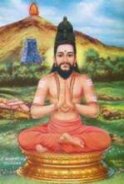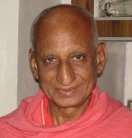

THE ESOTERIC
KANDAR ANUBHUTI
OR
THE SECRET TEACHING ON
GOD-EXPERIENCE
(A Treatise on Adwaitic Realization)
OF
SAINT ARUNAGIRINATHAR

 |  THE ESOTERIC KANDAR ANUBHUTI OR THE SECRET TEACHING ON GOD-EXPERIENCE (A Treatise on Adwaitic Realization) OF SAINT ARUNAGIRINATHAR |  |
 | by N.V. Karthikeyan |  |
| verses contents 16 17 18 19 20 21 22 23 24 25 .. 31 this verse in PDF version (4 parts) p-1 p-2 p-3 p-4 complete download of this book |
VERSE-21 கருதா மறவா நெறிகாண எனக்கு இருதாள் வனசந்தர என்றிசைவாய் வரதா முருகா மயில் வாகனனே விரதா சுரசூர விபாடணனே.Karuthaa maravaa neri kaana enakku Iruthaal vanasam thara endrisaivaai Varathaa murugaa mayil vaaganane, Virathaa sura soora vipaadanane. Non-thinking and non-forgetting state, I to attain, Commentary The Guru's initiation and the power conferred with it (Verse-20) were so powerful that the seeker is fired up with the aspiration to realise God soon. So, he intensifies his meditation and also prays to the Lord: "When will You condescend to grant me Your two Lotus-Feet that I may Experience (attain) that non-thinking and non-forgetting state of Mukti?" 'கருதா மறவா நெறி' -- 'Non-thinking and non-forgetting' is the state of Moksha. Moksha is not a place or location somewhere but soul's total freedom from bondage, from all limitations; it is a state of Absolute Consciousness wherein neither thinking nor forgetfulness is possible, because the individuality is merged in God and God alone remains; and 'the granting of Feet of the Lord' by which the Tamil scriptures denote that state where "I-ness and Mine-ness are abolished" also means Moksha. The Lord's Feet are not a means to Moksha but Moksha Itself. In verse 18, Lord Siva (The Supreme Absolute) is referred to as 'unaraa maravaa' -- 'உணரா மறவா' which is the same as 'Karutaa Maravaa' -- 'கருதா மறவா' of this verse. The meditation undertaken in verse-18 which is the path of Jnana is fortified here with prayer which is the path of Bhakti. Bhakti and Jnana not only go hand in hand but also merge into one another as one advances in Sadhana. The word 'Neri' (நெறி) has many meanings including 'path' 'state' 'Moksha' (முத்தி), etc. Hence attaining the state of 'non-thinking and non-forgetting' is the same as 'granting of the lotus-Feet of the Lord', both of which mean Moksha or Liberation. In this phenomenal world our experiences are governed by the pairs of opposite. Everything is in pairs. There is good and bad, light and darkness, ignorance and wisdom, birth and death, like and dislike, day and night, virtue and vice, thinking and forgetfulness, etc. and the list is endless. Why? Because the world is phenomenal or relative and we are conditioned beings, limited by space and time! We do not know what is unconditioned existence. But God, Moksha, Liberation, the Absolute, Consciousness, etc. are states of Unconditioned Being where these pairs of opposites (called dwandwas) do not obtain, cannot exist. The prayer in this verse is for this state of Unconditioned Existence, referred to as 'The Feet', 'Moksha', and 'Non-thinking and non-forgetting state'. The prayers for the grant of the Lotus Feet in this verse and in verse-35 are fulfilled in verse-44 wherein it is also confirmed that the Feet mean Moksha (Verses 42, 43 and 44 reveal the state of Realization). The Peacock-riding Lord is the granter of boons. He confers boons on His devotees very easily, in the same measure in which they ask, if their prayer is sincere. No sincere prayer goes unanswered by the Lord. He is Lord Murugan - one possessed of undecaying beauty, eternal youth. In his battle with the Lord, Surapadman finally took the shape of a huge Mango tree and the Lord's Vel clove it into two halves. At once, Surapadman assumed his original form. Again, the Vel cleaved him into two and threw the two parts into the sea. The mighty Vel of Lord Murugan could alone do it. He is, thus, the destroyer of the terrible Surapadman. The seeker prays to the Lord to grant him His two Lotus Feet. The Lord's Feet mean the Lord Himself. The granting of the Feet and the attainment of Moksha (God-consciousness) are one and the same. God is, to us, an object of worship, an object of meditation, however abstract it may be. He is something other than us, different from us, standing apart from us, to whom we offer worship or upon whom we meditate. He is an object of our worship or meditation. But the prayer is for a state different from this, wherein the Lord should become one with us, He should reveal Himself to us. He should condescend to grant His Lotus-Feet to us, to give Himself to us. God and His Feet mean the same thing. We usually meditate on the Lord in various ways, i.e., as being seated in our heart, or standing before us, etc. But all this involves thinking, and this is not what is intended here because this kind of meditation on God is not on His essential nature, but on a form and name. Hence, this meditation does not confer on us that state. Then how do we get it? Meditation should be on God as He is, as the divisionless Reality. God is the Supreme, He is the Absolute, He is Omnipresent existence. He should be meditated upon as such. In this meditation, the Absolute or the Omnipresence of God leaves nothing outside it; even the meditator does not exist independent of it. When, thus, the meditative consciousness in us attempts to meditate on the Lord as the all-inclusive Absolute and when this meditation becomes intense enough it, instead of being conscious of its individuality, becomes so absorbed in the consciousness of the Absolute that it gets lost in the latter which alone remains. As a wave that sinks in the ocean, trying to fathom its depth, would get dissolved and absorbed into the ocean and be the ocean itself, the two being of the same substance, so does the Jiva melt into the Absolute in its honest effort to meditate on the Lord as the divisionless existence. When, thus, the individual is melted into the Absolute, there is no Jiva to think or forget! He alone is, in His pristine glory, as the all-pervading presence. No individuality is left. This is referred to as "the granting of the two Lotus-Feet," by which the Tamil scriptures denote that state where "I-ness" and "Mine-ness" are abolished. Thus, when the Lord's Feet are granted, i.e., when God manifests Himself, the individual ceases to be, i.e., "I-ness" and "Mine-ness" cease. With the ceasing of the individual, the two conditions of "non-thinking" (i.e., the waking state wherein God is forgotten) and "non-forgetting" (i.e., the state of meditation wherein God is thought of) are transcended and the Jiva rests in God, which is the state of Mukti (liberation). Hence is the prayer for the granting of the two Foot-Lotuses (which is the path of Bhakti or Devotion) so as to attain the state of non-thinking and non-forgetting (which is the path of Jnana or Wisdom).Thus the state attained by Bhakti is the same as that attained by Jnana; Bhakti and Jnana blend into one another. They both lead to the same Goal. "Paraa Bhakti and Jnana are one," says Swami Sivananda. This blessing, the seeker prays for from Lord Murugan, who is a quick conferrer of boons on His devotees. |
| contents 16 17 18 19 20 21 22 23 24 25 .. 31 this verse in PDF version (4 parts) p-1 p-2 p-3 p-4 |
| ... www.kaumaram.com ... The website for Lord Murugan and His Devotees முகப்பு கௌமாரம் அட்டவணை மேலே தேடல் home Kaumaram contents top search |
Kaumaram.com is a non-commercial website. This website is a dedication of Love for Lord Murugan. Please take note that Kaumaram.com DOES NOT solicit any funding, DIRECTLY or INDIRECTLY. |